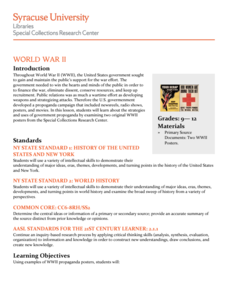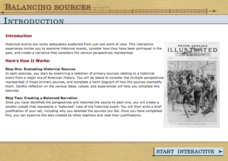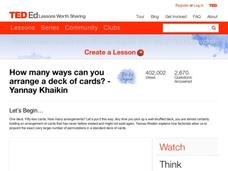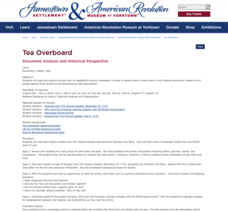Newseum
Before and After: Analyzing Turning Points in History
Scholars examine front-page news stories to gather evidence about significant historical events. They hypothesize how these events changed people's lives who lived through them and how they continue to impact lives today.
Newseum
Civil Rights: Turning Points
As part of a civil rights movement study, groups select an event from an interactive timeline that they feel marks a turning point in the struggle. After collecting evidence to support their choice, the teams develop a multimedia...
NPR
Partners In Winning The War Lesson Plan
How propaganda was used to change the concept of women's roles during World War II is the focus of an online exhibit provided by the National Women's History Museum. Packed with propaganda posters and pictures, the packet points out how...
Curated OER
Modern Interpretations
To conclude an eight-instructional activity study of the events that occurred in the early colonial period in Deerfield, Massachussetss, class members evaluate the point of view and bias found in late 19th and early 20th...
Roy Rosenzweig Center for History and New Media
The Battle of Trenton
The Continental Army's victory at the Battle of Trenton marked a turning point in the American Revolution. Young historians examine maps, read primary source materials, and create a timeline of events to understand why the victory was so...
National Woman's History Museum
Women, Propaganda, and War
Governments rely on propaganda to build support for wars. Class members examine six propaganda posters, two each from the Spanish-American War, World War I, and World War II, and analyze how the way women were portrayed in the posters...
Syracuse University
Erie Canal
While canals are not the way to travel today, in the first half of the nineteenth century, they were sometimes the best way to move goods and people. Scholars examine primary sources, including maps and pictures, to investigate the role...
Syracuse University
Civil War
What was it like to enlist as a soldier in the Civil War? By using enlistment papers, young scholars consider this question. After they've looked at the primary source and discussed it, they create a short story of a fictional soldier to...
Center for History Education
How Did the Public View Women’s Contributions to the Revolutionary War Effort?
Calling upon the legacies of Joan of Arc, Elizabeth I, and Catherine the Great, Esther Reed rallied Southern women to support the American Revolution. Using a broadside by Reed and other primary sources, such as poetry, young historians...
National Energy Education Development Project
Exploring Hydropower
In 2006, about 20 percent of the world's electricity was generated from hydroelectric power. In the presentation, scholars review the water cycle and gravitational energy to begin to understand how humans harness the power of water. They...
Syracuse University
Women's Suffrage Movement
Women gained the right to vote in the twentieth century, but the fight for equality dates back centuries. Using an invitation to an 1874 suffrage convention, eager historians consider the motivations behind supporters of the suffrage...
TED-Ed
A Digital Reimagining of Gettysburg
Why would Robert E. Lee order Pickett's Charge, an action that changed the course of the Civil War? Geographer and historian Anne Knowles uses digital technology to explain what she thinks is the missing piece in trying to understand...
Syracuse University
World War II
During World War II propaganda was as important to the war effort as the soldiers in the field. Scholars consider how the government communicated messages of patriotism with propaganda by examining pieces from World War II. Then, they...
Alabama Department of Archives and History
Alabama's 1901 Constitution: What Was at Stake?
Who should be able to vote? As part of a study of the 1901 Alabama Constitution, class members examine primary source document that reveal the reasons the authors gave to support their positions on this question and their assumptions in...
American Museum of Natural History
Being an Archeologist: Chuck Spencer
Meet Chuck Spencer, an archeologist who studies the Zapotec people who lived in the Valley of Oaxaca, Mexico over 2000 years ago. Spencer shares in print his response to questions posed by kids.
National Energy Education Development Project
Exploring Oil and Gas
The United States consumes more oil than any other country, about 1.85 billion barrels (or 77 billion gallons) a day. Viewers learn about the history of fossil fuel exploration and how they are formed in an informative presentation. They...
Syracuse University
Harlem Renaissance
The music and literature of the Harlem Renaissance defined American culture, including its poetry. Using a poem from the period, individuals explore its musical qualities and how it is reflective of the period. Then, they use what they...
California Polytechnic State University
Australian Geography Unit
At the heart of this resource is a beautifully detailed PowerPoint presentation (provided in PDF form) on the overall physical geography of Australia, basic facts about the country, Aboriginal history, and Australia culture and lifestyle.
Annenberg Foundation
Balancing Sources
Pupils turn into investigative reporters throughout history to learn what it takes to balance different primary sources on the same topic. They use what they learn to create a narrative based on their own interpretation of a historic...
Generation Rx
Medication Safety for Teens
The most valuable way to protect teenagers from prescription drug abuse is to equip them with knowledge. An informative slideshow covers various aspects of prescription drug safety, including the importance of keeping one's prescription...
TED-Ed
How Many Ways Can You Arrange a Deck of Cards?
Entertain and grab your learners' attention with a short video clip that engagingly teaches the concept of a permutation and how a factorial is a wonderful shortcut for theoretical probability calculations.
Jamestown-Yorktown Foundation
Tea Overboard
While less well known than the event in Boston, the Yorktown Tea Party was equally decisive in turning community sentiment against Great Britain. To gain an understanding of why the colonists objected to the Tea Act, young historians...
Syracuse University
American Industrial Revolution
While the Industrial Revolution may have fueled America's rise to the top of world markets, the child laborers often faced dangerous conditions. Using primary source images and other information, scholars consider what these children...
National Park Service
Civil War to Civil Rights: From Pea Ridge to Central High
Explore how the Civil War impacted the Civil Rights Movement. Class members complete a series of projects for a unit that uses a layered curriculum approach to learning.























